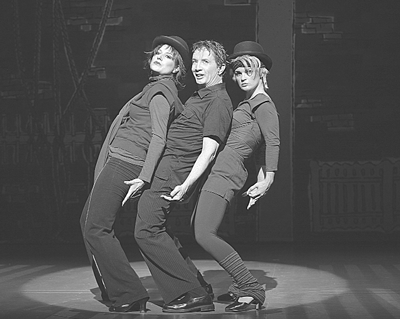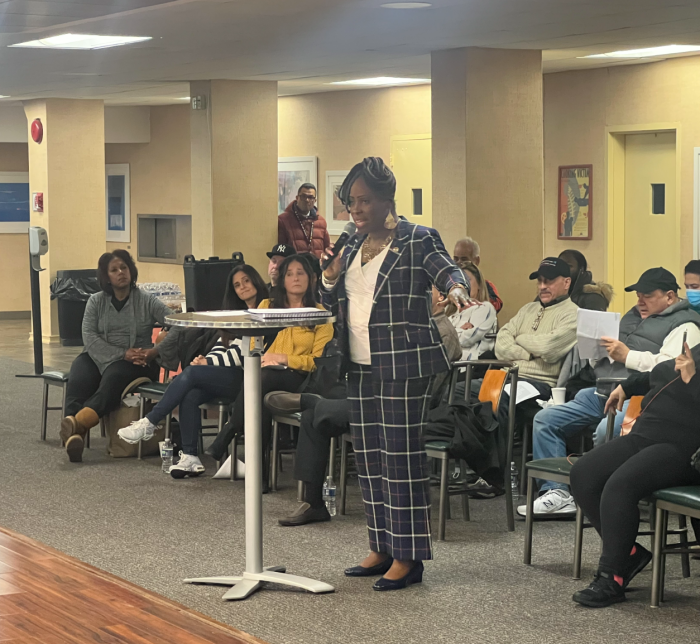By Scott Harrah
In this parody of the genre known as the “one-man” show, Canadian comedian Martin Short satirizes the autobiographical format that has recently been popularized on Broadway by the likes of Billy Crystal and Elaine Stritch. Granted, “Martin Short: Fame Becomes Me” often comes across as a glitzed-up version of “Forbidden Broadway,” poking fun at Broadway and America’s celebrity culture, and it may not be the most original concept for a 90-minute show, but it never, ever fails to entertain. While most stand-up memoirs either focus solely on one performer’s upbringing or career, “Fame Becomes Me” is not really a “one-man” show at all. Instead, it is an intelligent, vaudeville-style send-up of Short’s childhood in Canada and subsequent rise to fame on television in “SCTV” and “Saturday Night Live,” and later on Broadway in “The Goodbye Girl” and his Tony-winning performance in “Little Me.” Ditching the solo act in favor of a screwball revue, Short brings along a brilliantly talented ensemble of comedians that perform various skits and celebrity impersonations. Together they tell his life story, using hilarious hyperbole that’s less fact than clever, witty fiction.
“Fame Becomes Me” is also filled with laugh-out-loud funny songs by the Tony-winning songwriting team Scott Wittman and Marc Shaiman (of “Hairspray” fame). Shaiman even trades bon mots with the star between songs.
Some have been unnecessarily critical of the show, contending that it jabs the satirical needle into material that has been mined many times before, but few have noted that Short’s humor is so unique, outrageous and stylized that it does not really matter what subject he is skewering for laughs. In his fictionalized version of his life story, Short lampoons his father’s purported fame in Canada as an actor, working on a low-budget Canadian version of “The Wizard of Oz” set in Saskatchewan, with the brilliant Mary Birdsong doing a dead-on impersonation of a young, pill-popping Judy Garland who has an odd fascination with Canadian “diva” Anne Murray. Along the way he mocks the volatile relationship of Elizabeth Taylor and Richard Burton in their “Cleopatra” glory days and does a quivery-voiced Katharine Hepburn telling raunchy jokes that question Spencer Tracy’s sexuality. Meanwhile, Brooks Ashmanskas plays choreographer Tommy Tune (portrayed in absurd stilts, towering several feet above his chorus line), and chain-smoking Bob Fosse having a heart attack while rehearsing with his scantily clad dancers. Does all of this sound tasteless and politically incorrect? Of course, and virtually every ethnic group, minority and religion is fair game here. Although Short’s hilarious jokes strike some low blows, they are never mean-spirited. One of the funniest numbers is “Step Brother de Jesus,” an account of his supposedly bad experiences auditioning for rock operas such as “Hair” and “Godspell” and Off-Broadway schlock in the early 1970s that was obsessed with nudity. Short and the cast emerge from under a canvas, all sporting skintight body stockings painted with parts of the male and female anatomy.
The most brilliant portion of the show does not feature Short at all. Mary Birdsong and Nicole Parker do scathingly hilarious, on-target skits about star-studded awards shows, complete with impersonations of Joan Rivers, husky-voiced Jody Foster, Renee Zellweger (featuring the star’s infamous squinty-eyed, pouty-lipped facial expressions) and Quebec chanteuse-turned-Vegas-superstar Celine Dion. “You’re French-Canadian royalty!” Rivers gushes to Dion as she arrives on the red carpet. Short’s also not afraid to hand over the spotlight entirely to cast members such as the golden-voiced Capathia Jenkins, who belts out the song “Stop the Show,” based on those stereotypical “11th hour” numbers from Broadway’s golden age, when a heavyset African-American lady would sing a gospel or blues song. Ms. Jenkins sings that these songs were usually written by “gay white Jews,” to pad out the thin plot of a mediocre show.
Short also brings to life his ineffectual, celebrity-obsessed milquetoast character Jiminy Glick. Each performance features a randomly picked celebrity from the audience (in homage to the 2003 British Broadway import “The Play What I Wrote”). To date, everyone from Cynthia Nixon and Tracy Ullman to Nathan Lane and New York Knicks star Channing Frye have sat in the hot seat to be asked Glick’s inane questions. Whether he’s making fun of celebrities or his own demons, Short delivers an evening of nonstop laughs, making “Fame Becomes Me” one of the funniest musical comedies you will likely see this year.















